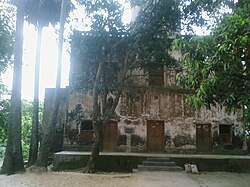Jyoti Basu
From Wikipedia, the free encyclopedia
| The neutrality of this article is disputed. (May 2011) |
| Jyoti Basu | |
|---|---|
 | |
| Jyoti Basu | |
| 6th Chief Minister of West Bengal | |
| In office 21 June 1977 – 6 November 2000 | |
| Preceded by | Siddhartha Shankar Ray |
| Succeeded by | Buddhadeb Bhattacharya |
| Personal details | |
| Born | 8 July 1914 Calcutta, Bengal Presidency,British India |
| Died | 17 January 2010 (aged 95) Kolkata, West Bengal, India |
| Nationality | Indian |
| Political party | Communist Party of India (Marxist) |
| Spouse(s) | Basanto Basu (1940–1942) Kamala Basu (1948–2003) |
| Residence | Kolkata, West Bengal, India |
| Alma mater | Presidency College, Kolkata |
| Religion | None (Atheism) |
| Signature |  |
| Website | www.jyotibasu.net |
| As of 17 January, 2010 Source: Communist Party of India (Marxist) | |
Jyoti Basu (8 July 1914 – 17 January 2010; also Jyoti Rindra Basu)[1] was a Bengali politician belonging to the Communist Party of India (Marxist)from West Bengal, India. He served as the Chief Minister of West Bengal from 1977 to 2000, making him the longest-serving Chief Minister of any state of India. Basu was a member of the CPI(M) Politburo from the time of the party's founding in 1964 until 2008.[2][3] From 2008 until his death in 2010 he remained a permanent invitee to the central committee of the party.
Early life and education [edit]
Jyoti Basu was born on 8 July 1914[4] as Jyotirindra Basu[5] at 43/1 Harrison Road (now Mahatma Gandhi Road) Calcutta[5] into an upper middle-class Bengali family. His father, Nishikanta Basu, was a doctor from the village of Barudi in Narayanganj District, East Bengal (now in Bangladesh), while his mother Hemalata Basu was a housewife.[6] Basu's schooling started at Loreto School at Dharmatala, Calcutta (now Kolkata), in 1920. It was there where his father shortened his name and he became Jyoti Basu. However, he was moved to St. Xavier's School in 1925. Basu completed his undergraduate education and received the honours in English from the Presidency College of the University of Calcutta.[5]
After completing his undergraduate studies in 1935, Basu set for England for higher studies of Law.[citation needed] It is said that Basu attended lectures by Harold Laski at the London School of Economics in late 1930.[citation needed] It was in England that Basu was introduced to the activities of politics through the Communist Party of Great Britain.[citation needed] There he was inspired by noted Communist philosopher and prolific writer Rajani Palme Dutt. In 1940 he completed his studies and qualified as a Barrister at the Middle Temple.[7] In the same year he returned to India. In 1944 Basu became involved in trade union activities when CPI delegated him to work amongst the railway labourers. When B.N. Railway Workers Union and B.D. Rail Road Workers Union merged, Basu became the general secretary of the union.

No comments:
Post a Comment